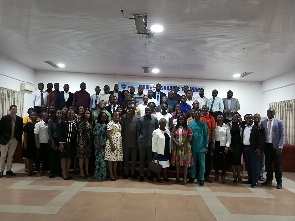Dr. Justice Ofori, the Commissioner of Insurance, has revealed that only about six percent of all cargo imported into the country in 2021 was insured locally. He said some importers believe the size and nature of the insurance market in Ghana render it uncompetitive and ineffective in underwriting cargo insurance; declaring that all that was about to change. Dr. Ofori made the revelation in a speech read on his behalf at the opening of a two-day marine insurance training, in Accra. The programme is being organized by the Insurance Brokers Association of Ghana (IBAG), the trade body of insurance brokers in Ghana, for insurance brokers and insurers within the Ghanaian insurance industry dubbed, “Essentials of Marine Cargo Insurance”. The training programme is aimed at building the capacity of the professionals to enable them actively to participate in the full implementation of the compulsory marine cargo business. Dr. Ofori said the National Insurance Commission (NIC) was grateful to the executives of the IBAG and Munich Reinsurance, South Africa for putting the two-day training together, especially at a time the insurance industry in Ghana was doing all it could to develop marine insurance. He said there had always been a provision in the insurance Acts that requires all imports into the country, except for personal effects, to be insured with a local insurer. “But this is yet to substantially impact our industry, simply because goods are usually imported on Cost, Insurance, and Freight (CIF) instead of Cost and Freight (CFR) as prescribed by section 222 of the Insurance Act, 2021 (Act 1061), to the detriment of the local market,” he said. He noted that available records indicate that along with a high value of imports/exports, significant investments have also been made in infrastructure development for the shipping industry. He said with the support of the Maritime Protocol, Maritime and Aviation Insurance Data (MAID), and more importantly insurance expertise, the future looks promising. Mr. Shaibu Ali, President, IBAG said the essence of the workshop was to reposition their members to take advantage of the new insurance law. He noted that under the old insurance law the punishment that was given if one imports his goods without insuring them apart from personal belongings such as clothes, television set, and every other thing was fine. “But the fines were not working because the importers were happy to pay the fines and walk away. So, this new law now says that if you import without insuring with the local insurer, you can go to prison for up to three years.” He said the new laws were going to put some amount of urgency on the importers to look at insuring details. Mr. Seth Kobla Aklasi, President of, the Ghana Insurers Association (GIA), said Ghana imported goods worth $23.7 billion as of 2021, while the total export figure was only $22 million; saying “clearly, we are importing more than we are exporting. Whatever the case is, there is the need to protect our economy”. He urged stakeholders in the insurance industry, especially insurance companies, to educate the public on the need for insurance so that there would be a win-win situation for all of them. He said in the period that Ghanaians were in now, the most important thing anybody could do now was to insure because of uncertainties; saying “we do not need to leave anything to chance.” Mr. Tawiah Ben-Ahmed, President, of the Chartered Insurance Institute of Ghana (CIIG), who commended IBAG for organizing the workshop, said for CIIG to achieve its objective of ensuring that insurance practices were of the highest possible standards and in conformity to internationally accepted best practices, continuous professional development and training must be embedded in their way of work across all the bodies in the insurance industry.













